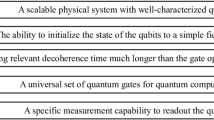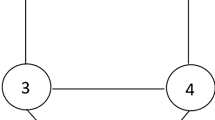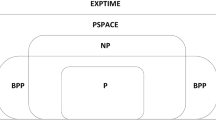Abstract
The standard monogamy imposes severe limitations to sharing quantum correlations in multipartite quantum systems, which is a star topology and is established by Coffman, Kundu and Wootters. In this work, we discuss some monogamy relations beyond it, and focus on the measurement-induced disturbance (MID) which quantifies the multipartite quantum correlation. We prove exactly that MID obeys the property of discarding quantum systems never increases in an arbitrary quantum state. Moreover, we define a new kind of sharper monogamy relation which shows that the sum of all bipartite MID can not exceed the amount of total MID. This restriction is similarly called a mesh monogamy. We numerically study how MID is distributed in a 4-qubit mixed state, and which relation exists between the mesh monogamy of MID and the level of obeying the standard monogamy.


Similar content being viewed by others
References
Bennett, C. H., et al.: Concentrating partial entanglement by local operations. Phys. Rev. A 53, 2046 (1996)
Coffman, V., et al.: Distributed entanglement. Phys. Rev. A 61, 052306 (2000)
Koashi, K., Winter, A.: Monogamy of quantum entanglement and other correlations. Phys. Rev. A 69, 022309 (2004)
Osborne, B.T.J., Verstraete, F.: General monogamy inequality for bipartite qubit entanglement. Phys. Rev. Lett. 96, 220503 (2006)
Hiroshima, T., Adesso, G., Illuminati, F: Monogamy inequality for distributed gaussian entanglement. Phys. Rev. Lett. 98, 050503 (2007)
Kay, A., Kaszlikowski, D., Ramanathan, R: Optimal cloning and singlet monogamy. Phys. Rev. Lett. 103, 050501 (2009)
Oliveira, T.R., Cornelio, M.F., Fanchini, F.F: Monogamy of entanglement of formation. Phys. Rev. A 89, 034303 (2014)
Sen(De), A, Sen, U: Channel capacities versus entanglement measures in multiparty quantum states. Phys. Rev. A 81, 012308 (2010)
Pawlowski, M: Security proof for cryptographic protocols based only on the monogamy of bells inequality violations. Phys. Rev. A 82, 032313 (2010)
Osborne, T.J., Verstraete, F: General monogamy inequality for bipartite qubit entanglement. Phys. Rev. Lett. 96, 220503 (2006)
Cornelio, M.F: Multipartite monogamy of the concurrence. Phys. Rev. A 87, 032330 (2013)
Bai, Y.K., Zhang, N., Ye, M.Y., Wang, Z.D: Exploring multipartite quantum correlations with the square of quantum discord. Phys. Rev. A 88, 012123 (2013)
Bai, Y.K., Xu, Y.F., Wang, Z.D: General monogamy relation for the entanglement of formation in multiqubit systems. Phys. Rev. Lett. 113, 100503 (2014)
Prabhu, R., Pati, A.K., Sen(De), A., Sen, U.: Conditions for monogamy of quantum correlations: Greenberger-horne-zeilinger versus W states. Phys. Rev. A 85, 040102(R) (2012)
Braga, H.C., Rulli, C.C., Oliveira, Thiago R.: Monogamy of quantum discord by multipartite correlations. Phys. Rev. A 86, 062106 (2012)
Streltsov, A., Adesso, G., Piani, M., Bruß, D.: Are general quantum correlations monogamous? Phys. Rev. Lett. 109, 050503 (2012)
Luo, S: Using measurement-induced disturbance to characterize correlations as classical or quantum. Phys. Rev. A 77, 022301 (2008)
Modi, K., Brodutch, A., Cable, H., Paterek, T., Vedral, V.: The classical-quantum boundary for correlations. Discord and related measures. Rev. Mod. Phys. 84, 1655 (2012)
Brodutch, A., Terno, D.R: Quantum discord, local operations, and maxwell’s demons. Phys. Rev. A 81, 062103 (2010)
Luo, S., Fu, S: Measurement-induced nonlocality. Phys. Rev. Lett. 106, 120401 (2011)
Fu, S., Luo, S.: Maximum nonlocal effects of quantum states. Int. J. Quantum. Inform. 09, 1587 (2011)
Modi, K., Paterek, T., Son, W., Vedral, V., Williamson, M: Unified view of quantum and classical correlations. Phys. Rev. Lett. 104, 080501 (2010)
Salinia, K., Prabhub, R., Sen(De), A., Sen, U.: Monotonically increasing functions of any quantum correlation can make all multiparty states monogamous. Ann. Phys. 348, 297 (2014)
Liu, S.Y., Zhang, Y.R., Zhao, L.M., Yang, W.L., Fan, H.: General monogamy property of global quantum discord and the application. Ann. Phys. 348, 256 (2014)
Rulli, C.C., Sarandy, M.S.: Global quantum discord in multipartite systems. Phys. Rev. A 84, 042109 (2011)
Okrasa, M., Walczak, Z.: Quantum discord and multipartite correlations. Europhys. Lett. 96, 60003 (2011)
Acknowledgments
This work was supported by the National Natural Science Foundation of China (Grant Nos. 11401347, 61202317, 61572246, 61602232), Shandong Provincial Natural Science Foundation, China (Grant No. ZR2015FQ006), the Plan for Scientific Innovation Talents of Henan Province(Grant No. 164100510003), and the Key Scientific Project in Universities of Henan Province (Grant No. 16A520021).
Author information
Authors and Affiliations
Corresponding author
Rights and permissions
About this article
Cite this article
Liu, F., Li, F., Wei, YX. et al. Monogamy Relations of Measurement-Induced Disturbance. Int J Theor Phys 56, 1903–1911 (2017). https://doi.org/10.1007/s10773-017-3336-4
Received:
Accepted:
Published:
Issue Date:
DOI: https://doi.org/10.1007/s10773-017-3336-4




